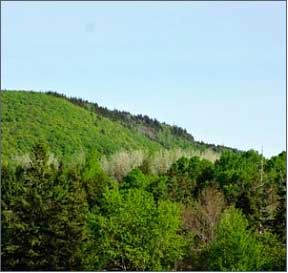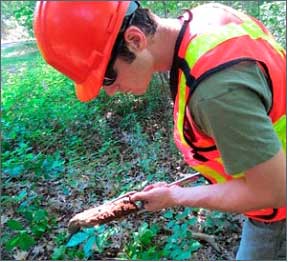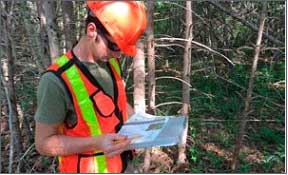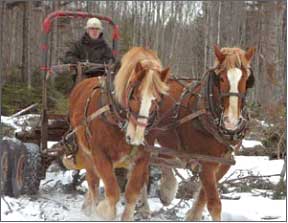Module 14: Hiring and Working with a Woodland Contractor
Module 14 - Lesson 2 - Case Study 2
Case Study 2
There are few woodland owners that know as much about the woods as Kelly Baker. He has been practically raised holding the reins of a team of horses, skidding logs, and he has spent more than half a century working the land on the family farm, which he now solely owned.
From the old pasture Kelly could see clear across the Bay of Fundy to Cape Blomidon, where on sultry days the fog laid spread like a grey blanket. He could tell if there was weather coming by the way the sky looked over the wide tidal flats. After all, it was the bay with the highest tides in the world, and that had to mean something.
Kelly Baker was in a fix. For decades he had logged the lower slopes of his property, never taking too much, so that the red spruce that grew so well on the south slope of the mountain continually regenerated itself. He picked trees here and there for harvesting, checking for soundness and straightness, always with an eye to where the tree should fall if it was cut. He was seldom wrong.

When he needed firewood he went further up the mountain, where the sugar maple grew tall and abundantly. He was careful to maintain the old woods road in good condition, since that was his only way in and out of his woodland. Kelly hoped he would never have the need to get out of the woods quickly in an emergency, but if he needed it the road was there.
Trouble was, Kelly was getting on in years, and he needed some money. He had even sold his old horse to a farmer in New Brunswick. The spruce he had had so little problem staying ahead of, was now so far beyond his ability to harvest and it pained him to even look at them. The groves of trees, so carefully considered for cutting in the past now stared back at him, almost in reproach.
He wondered about hiring someone to help him. A family he knew owned several large pieces of harvesting equipment - and the men to match – who could work 24/7. That was their way of putting food on the table and new pickups in the yard.
Thing was, Kelly could not abide clearcutting. For kilometers in every direction from his property on the mountain he could see the great expanse of the Cobequid Hills and the rents in the landscape where the forest had been harvested. Even now, when he needed money, he could not bring himself to subject the woods - where five generations of Bakers had worked - to being felled in one swoop.
Sure, the guys with the harvesters had come calling several times, and as they stared at the ground and kicked the tires of their new trucks, each successive offer had been greater. Kelly appreciated their straightforward approach. They were businessmen, and their business was doing well.
But Kelly had other ideas. For years he had enjoyed reading a monthly journal called Rural Delivery. It was the only magazine to which he subscribed, and he had a fondness for the articles that described real-life small-scale farming and forestry, because it awakened good memories of past times on the farm. From these articles he knew that there were other people that thought the way he did.
One day during a late winter storm that caked the house and barn in crusty snow, Kelly decided to place an ad in Rural Delivery. The ad stated:
Standing wood for sale, nearly all spruce, with good access. Partial cutting only, must be light on the land. Call for a tour.
The phone began to ring even before he had received the next issue of the magazine.
One call intrigued him. It was from a forester who worked for a woodland owner cooperative. Steve indicated he would like to come out the following week and have a look at Kelly’s woodland.
The snow crunched underfoot as Kelly and Steve made their way across the pasture to the edge of the white spruce stand. As soon as they entered the woods the snow level dropped and their pace quickened. Two deer melted away among the trees in front of them as they moved forward.
Kelly recounted the history of the farm, and stated he was the last of the Baker line that lived locally. To him, the old farm property was more than money in the bank. It was a legacy, the only physical remnant of his family’s history here on the mountain.
Steve understood. He told of his own family’s history in the River Hebert area, and how most of the family had scattered across the continent once the last wooden ship was built there. Times had changed, but valuable threads were still recognizable. Steve had an affinity for wood – perhaps some sort of genetic memory - that compelled him to study forestry.

Another of those vital threads was the Baker farm. Kelly wished to conserve some of the family heritage that existed on the mountain. More to the point, he didn’t want to be the one to sell it all - to cut and run.
Steve pointed out to Kelly it might be important to take one step at a time, and before hiring a logger he should have a stewardship plan. The plan would be built around Kelly’s objectives and his need for income. Kelly agreed, as long as the costs were reasonable. For the first time, there would be a written plan for the Baker woods.
It was nearly two months before the Baker stewardship plan was read y. Steve had visited Kelly and his woodland twice more to cruise the property and to keep Kelly updated on his progress. Kelly was impressed with the forester’s thoroughness and attention to detail, and with his breadth of knowledge. The forester seemed to anticipate Kelly’s concerns, and the resulting plan was exactly what Kelly had hoped.
y. Steve had visited Kelly and his woodland twice more to cruise the property and to keep Kelly updated on his progress. Kelly was impressed with the forester’s thoroughness and attention to detail, and with his breadth of knowledge. The forester seemed to anticipate Kelly’s concerns, and the resulting plan was exactly what Kelly had hoped.
While tagging along with Steve one day, Kelly had asked him why he was taking the time to sample the soil with his soil auger. Steve explained not all soils were the same, and up here on the mountain it was very important to gauge the risk of trees being blown down by the wind. Kelly replied although he had been working up here for decades, he had only noticed a few trees had blown as a result of his “thinning”. It was true, Steve noted. He marveled at how wind-firm the trees up here seemed to be.
An old pasture which had grown up in white spruce was another story. These trees were starting to show signs that spruce bark beetles were weakening them. A number of trees had already died, and brown needles fell to the ground like rain. Other trees showed tell-tale cracks near their base, which indicated rot had set in. The two men nearly tripped over the tree roots which were spread across the ground like a giant spider’s web. It was clear this entire stand of white spruce would need to be harvested – and all at once.

Steve knew of a contractor who would be able to carry out the harvesting work. Jim, he said, had a small crew of two chainsaw operators, a small forwarder, or porter, and best of all, a horse. Jim had worked on several lots for the members of the woodland cooperative and had a good reputation as a reliable contractor.
It was important, Steve stated, that if Jim agreed to do the work a contract should be drawn up to ensure both Kelly and Jim knew what to expect of each other. It was obvious Steve firmly believed in contracts, and while Kelly didn’t much like paperwork he agreed to think it over once he knew the details. Meanwhile, Steve would try to contact Jim as soon as possible.
The following week Jim arrived at the Baker farm in his battered pickup. Kelly could sense he was a horseman right away, and the two were soon discussing whiffle-trees and the importance of getting horseshoe heels beveled just right.
Steve soon arrived and the trio set off to walk Kelly’s woodland. They all agreed the old pasture spruce should be completely harvested because of the extent of dying trees, since any trees left standing would certainly blow down. Here, Jim could use his forwarder to extract the wood to the side of the road. Steve indicated he could perhaps arrange to have the harvested site planted two or three years later, likely at little or no cost to Kelly.
Once they were back in the woods, it was not long before Jim expressed his enthusiasm for tackling the job of harvesting some of the red spruce and hardwood in a selection harvest. Most of the area was in a shallow valley which protected the trees from wind. Here, Jim stated, he could use his horse to extract the wood on some of the area closest to the road, and use his forwarder on the remainder.
Steve emphasized a contract should be the basis for doing any of the work, and offered to put one together. Jim already had Workers Compensation coverage for both himself and his employees, and also had insurance for public liability and property damage.
 Kelly was familiar with the location of the boundary lines of the property and offered to clean them out and repaint the tree blazes that hadn’t received a fresh coat for more than twenty years. He would also make sure the farm gate on the woods road was left open while Jim was working there and while wood was being trucked. Steve noted all these details on the contract.
Kelly was familiar with the location of the boundary lines of the property and offered to clean them out and repaint the tree blazes that hadn’t received a fresh coat for more than twenty years. He would also make sure the farm gate on the woods road was left open while Jim was working there and while wood was being trucked. Steve noted all these details on the contract.
Jim agreed to pay Kelly every two weeks, based on the mill scale of the wood. The hardwood would be scaled at the landing by Steve, and Jim would make payments to Kelly based on this scale. Jim also promised every stick of wood on the landing would be trucked within a month of the end of the harvesting operation. Any damage to the road caused by trucks or equipment would be fixed by Jim. He would also ensure, because the operations would be taking place during fire season, adequate fire-fighting equipment would be stored on site.
Kelly liked this arrangement since Jim would need to truck the wood quickly. He had seen many small piles of wood beside roads in his travels. The piles had been there for months, even years, and most were decayed beyond the point of usefulness.
When the details of the contract were complete, Steve had both Kelly and Jim sign the document. Steve added his signature as a witness and eachwas given a copy. The real work could begin!
Sitting near his kitchen window overlooking his fields, Kelly was content. It was now high summer, the woods were dry and it was the perfect time for forestry work. Kelly watched as Jim’s forwarder was unloaded from its flatbed and began to gather wood that the chainsaw operators had begun cutting the week before.
Then he saw the sight that he was really anticipating – a pickup truck drawing a horse trailer up the hill towards his woods. Kelly’s face widened as he grinned, sprang to his feet and rushed out the door, leaving his half-finished cup of tea on the table.
